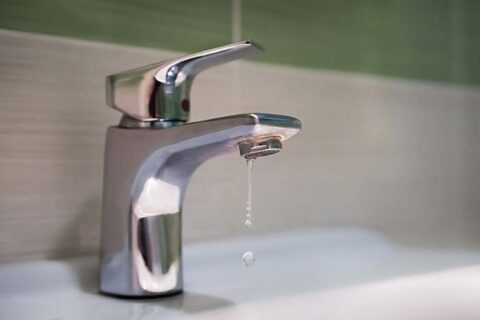What’s That Dripping Sound?

However, there are a lot of causes of dripping sounds that are easier to locate than you might think. One of these causes requires almost no work from you and another is simple to fix yourself. The third would require a plumber, but it has a source that’s less difficult to pinpoint. Here three common causes of that dripping sound you’ve been hearing.
Did You Just Run a Faucet?
If you’ve been running a faucet and have just turned it off, you could hear dripping from within the walls, at the drain, or even in the pipe by the showerhead if you were using the shower.
When you turn off the water and the bulk of the water drains away, there’s still a sheen of water coating the inside of the pipe. That water could run down the wall of the pipe, it could evaporate, or it could drip until all the excess water was gone.
It’s not unusual to have that leftover water drip down from inside of the pipe, which would cause a dripping sound. Another possibility is that a small amount of water was left right at the drain opening, and you’re just hearing that water drip down into the pipe.
You’ll want to pay attention to whether or not the dripping noise stops. If you run the faucet, turn it off, hear the dripping, and then hear it stop shortly afterward, then you’re likely dealing with leftover water. You can take a tissue and dab up any pooled water by the drain and see if that helps.
Are Your Drains Slightly Slow?
When you turn on a faucet, the water should drain away quickly. If the drains become partially clogged, then the water will drain away rather slowly. However, if the drains are a little constricted, you might not notice a change in how quickly the water drains out of the basin. However, you may hear dripping from water that was caught on the clogging material finally drips away.
Monitor your drains – even if they don’t appear to be slow. Consider giving your drains a dose of baking soda, vinegar, and hot water to clear out any gunk that’s starting to build up on the sides. Simply pour baking soda into the drain, chase it with white vinegar, close the drain, and wait about an hour. Then, open the drain and pour in hot water.
Have Temperatures Gone Below Freezing?
A frozen pipe is no one’s friend, but it’s easy to locate. If the dripping sound is new and you’ve just had temperatures overnight go below freezing, then you could have a minor crack. That type of leak will be in a pipe in an outer wall that was exposed to the cold temperatures.
Have a plumber check around your house and listen to the dripping sound. While this does mean that a pipe might need to be replaced, it’s not something that would take months to locate. Plumbers are pretty good about finding these types of plumbing issues, and chances are that you’d start to see an actual water stain if the leak were left unfixed.
If you’re still at a loss regarding the source of the dripping sound, contact us at Parker & Parker Plumbing. Don’t let a dripping sound drive you out of your home. We can help you locate the sound and fix the source.
““
